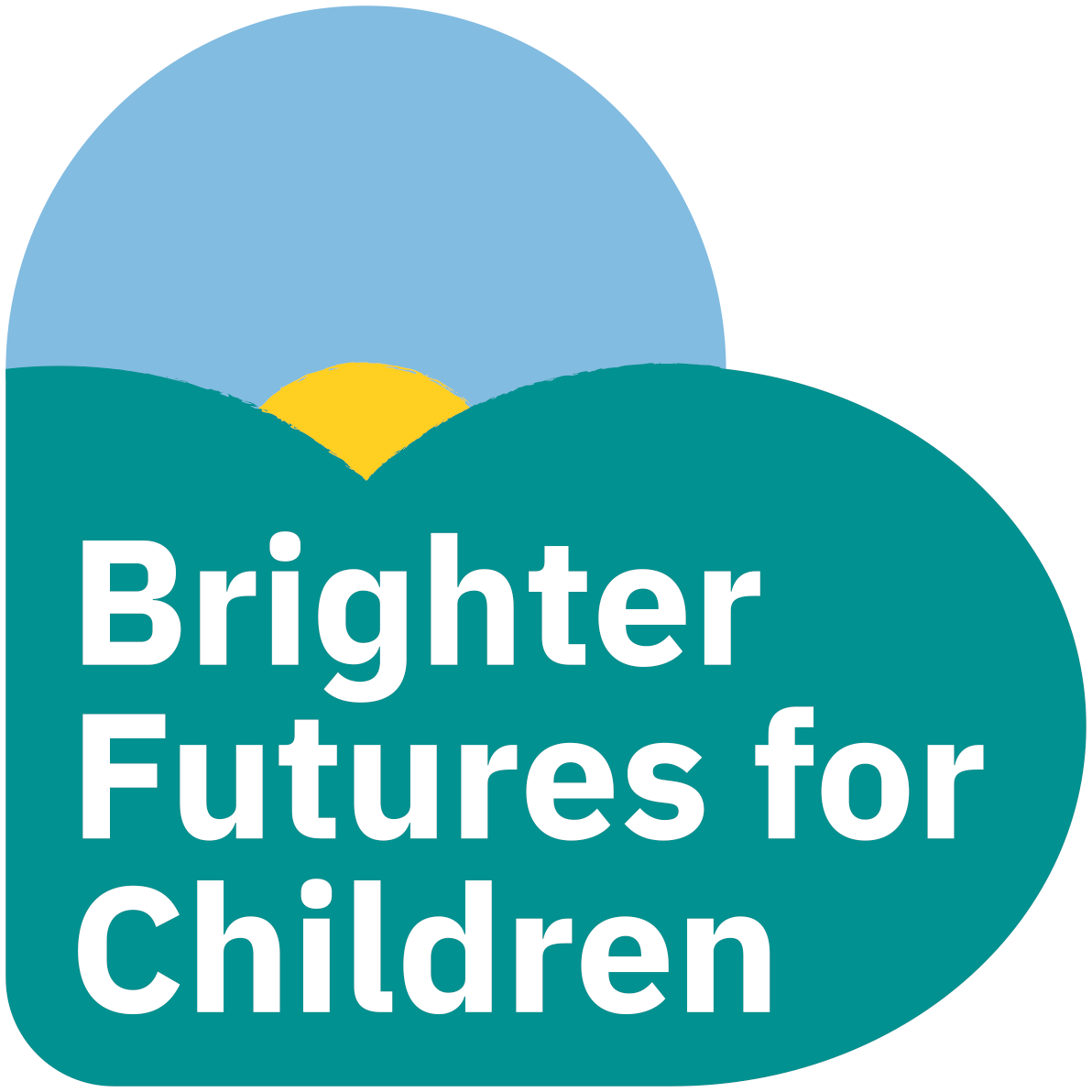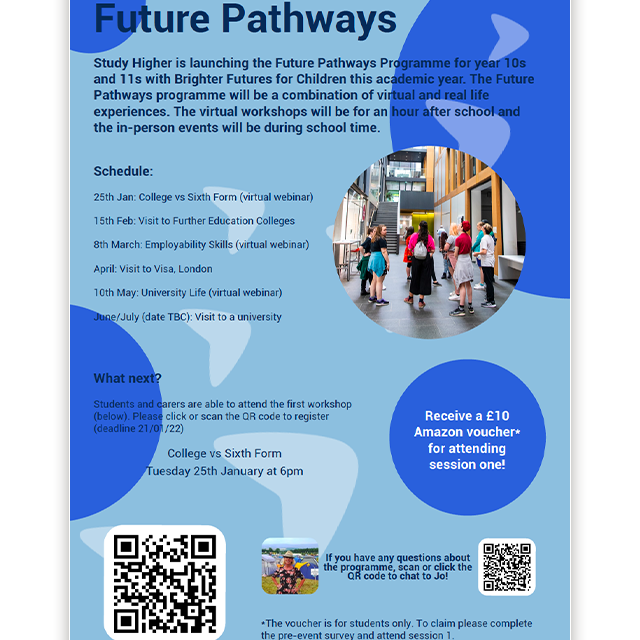- Home
- YOUNG PEOPLE’S ZONE
- Care leavers
- Care leavers – Financial policy
Our financial policy for care leavers
This section explains what financial support you can expect to receive from Brighter Futures for Children (BFfC) if you are aged 16 to 21 and you are looked after or receiving leaving care services from us.
You can also download the information as a document if you click here.
If you are care experienced you will fit into a particular category of ‘care leaver’. These category names and definitions are described below. If you need further help understanding them, you can discuss them with your social worker or leaving care advisor.
You are an eligible care leaver if:
- you are aged 16 or 17; and
- you are currently a young person in care, and
- you have been in care for a period of at least 13 weeks since the age of 14, which must include at least one day since your 16th birthday.
You are a relevant care leaver if:
- You are no longer cared for by the local authority, but you have previously been an ‘Eligible’ care leaver and,
- You are 16 or 17 years old.
You are a former relevant care leaver if:
- You are aged between 18 and 21 and before reaching 18 you were or had been a Relevant Care Leaver or immediately before you stopped being cared for you were an eligible care leaver.
- If at the age of 21 and up to reaching the age of 25 where you continue or return to be in full time education or training, then you can remain as a former relevant care leaver for the duration of the agreed programme.
You are a qualifying care leaver if:
- You are at least 16 but under 21, and
- You were a cared for young person prior to the making of a Special Guardianship Order which was in force when you reached 18, or
- If at any time after you reached the age of 16 you were no longer looked after, or accommodated or,
- You were privately fostered and assessed to be in need.
You may have been living in:
This is accommodation within a family home. You will have your own bedroom and will be engaged in education, employment or training. Support is provided informally by your host family. You are expected to make a contribution towards living costs and purchase your own food for lunches and evening meals.
Provision in Reading is run by private providers. These properties usually accommodate between two and five care leavers and have support staff on site 24 hours. The higher staffing ratio provides for more support to help you to engage with services and appointments as well as helping you to grow your independent living skills. You may also receive occasional assistance with transport.
Provision in Reading is run by private providers. These properties are usually standalone properties, flats, apartments or homes of multiple occupancy. You can expect to have your own room, kitchen and bathroom. In these provisions, you are given an opportunity to understand the realities and challenges of living independently. Support is classed as ‘floating support’ and can be provided by the private provider depending on needs. The Leaving Care Service will continue to offer floating support alongside their visits with you.
All allowances should be based on an assessment of need and be set out in your pathway plan. The plan must also highlight any attached conditions, how payments will be made, the frequency of payments and when they will be reviewed. Legislation requires this guide must include items that can be used as incentives to help motivate you to achieve your goals.
Financial entitlements

As part of our commitment to you, we will contribute to council tax payment for all young people who meet Leaving Care criteria.
The contribution is dependent on your age, as follows:
- Full exemption aged 18 to 19
- 66% discount aged 19 to 21
- 33% discount aged 21 to 25
We recommend you consider opening a bank account which your social worker can help you to do before your 16th birthday. They will ensure you have the necessary ID and a supporting letter. A payment schedule of your entitlements will be confirmed prior to payments being paid directly into your account. BFfC may choose not to make direct cash payments to you where there are concerns around budgeting or risk taking behaviours, though this will be discussed with you and you will be notified of the payments schedule.
Payments can be made to all high street banks and we recommend you shop around for the best offer when finding and joining a bank.
Savings accounts and ISAs
When you leave care, you should have a short-term savings account, with savings you and your carer/residential provider have made while you were in care. Some of this may have been used to buy things before you moved to living independently. It is important when you leave care to try to continue to save in case of emergencies or for special treats. If you do not have a bank account at this stage, your leaving care advisor can help you to get one set up. A bank account is not only important to have for savings, but also to pay your wages or benefits into and potentially any financial support you receive from us.
If you were in care for more than 12 months you will have a Junior ISA which was set up with £200 initially. When you become 18 years of age, these accounts will become Adult ISAs and you will be able to access this money. Your social worker and leaving care advisor will be able to give you information about the money in your account and advise you how to access this money.
Remember
Your savings are there to support you in your move to independence and adulthood. Dependent on your living arrangement, this may include buying items for your own place, driving lessons and supplementing the financial support available to you if you continue in education or training. It is important that you think before you spend your savings, as once the money has been spent, it may be a long time before you are able to add to them again.
Savings over £16,000
Some young people may have significant savings. This includes money in bank accounts or ISAs but can also include inheritance or compensation given by the courts. If you have savings of £16,000 or more, you will not be eligible for Universal Credit.
You can put up to £15,000 of these savings into a tax-free savings account, such as an ISA or Trust Fund. If you have a lot of savings, it is important to get appropriate financial advice, which your leaving care advisor can help you find.
All eligible, relevant and former relevant care leavers, up to and including their 21st Birthday when living in semi-independent, independent accommodation or return to live with parent/s, are entitled to a birthday allowance or gift equivalent as set out below.
- 16th or 17th Birthday – £50 (if not in foster care, living in family and friends foster care arrangement and residential settings)
- 18th to 21st birthday – £50
If serving a remand or custodial sentence you will receive a £20 postal order for your birthday. (£20 postal order and remainder to be available on release if in custody).
Up to £75 every three months – This is a discretionary payment dependent on an assessment of need.
All eligible, relevant and former relevant care leavers up to 21-years-old, when living in semi- independent, independent accommodation or living with family members, are entitled to a festival allowance or gift equivalent as set out below. Festival allowance can be paid in accordance with festival dates of your choosing, i.e. Christmas, Eid or Hanukkah etc. If serving a remand or custodial sentence you will receive a £20 postal order and the remaining balance will be saved for you on release.
16 or 17 – £100
18-21 – £25 or gift equivalent
(£20 postal order and remainder to be available on release if in custody)
Your leaving care advisor/social worker will signpost and assist you to make any claims for benefits under current universal credit legislation. In some circumstances there may be a delay in you receiving your benefit and BFfC will provide additional support, for a period of no more than five weeks, until benefits are paid to you.
Up to £2,000 – Needs Led Assessment based on your household requirements.
Eligible, relevant and former relevant care leavers will be supported with a grant of up to £2000 towards setting up home. Agreement is required from your leaving care advisor for use of your Leaving Care Grant prior to purchasing any items. Wherever possible your leaving care advisor will arrange payment and delivery. If you plan to leave a supported living arrangement after the age of 21 your Leaving Care Grant will remain available to you for a maximum of 12 months after your 21st birthday (or 12months after you have left university over the age of 21).
£60 per week
If you are an eligible or relevant care leaver living semi-independently, you will receive a personal allowance until you reach 18.
Wherever possible this will be paid directly into your bank account. However, if we are worried about how you are spending your money, we may ask you to visit the Civic Offices for payment. This will always be discussed with you in advance by your leaving care advisor.
While under 18 and as an eligible or relevant care leavers you cannot claim Universal Credit.
If you are not in employment, your leaving care advisor can support you to make an initial benefit claim on your 18th birthday. Once your claim has been made you will receive weekly support until receipt of your first benefits payment as follows:
- First five weeks at £60
The following additional support may be available to you, and will be subject to your level of need following five weeks:
- £15 food voucher and £10 utilities (this will be time limited)
- Thereafter food parcels or referral to local food banks will be offered.
If you’re experiencing hardship, please contact your leaving care advisor at the earliest opportunity. They’ll be able to support you to complete a budget plan and can advise you on getting support from Job Centre Plus and the Citizens Advice Bureau.
Up to weekly bus pass rate (dependant on placement)
Eligible, relevant and former relevant care leavers who are in education, employment or training, are entitled to the current weekly bus pass rate per week provided they are not entitled to travel expenses through their college or employer and are not within a reasonable distance from their college or work place. This needs to be documented within your pathway plan and your social worker or personal advisor will gain approval for this funding.
- Travel to access leisure activities and minimise social exclusion where appropriate on the days they need to attend
- Travel for those earning under £150 per week on the days they need to attend learning, volunteering or working. This can either be:
- A bus pass (applications for pass via educational institutions to be made where possible) or
- A bicycle package, including a bike, a helmet, lights and padlock. This would be supplemented by a bus pass in January and February.
University
We will help you with your application, and financial costs.
The website Propel provides full information about each educational institution’s provision for care leavers, as well as inspirational stories from care-experienced students.
Your leaving care advisor will:
- support you with your applications and ensure you receive your full entitlements, and
- record your financial arrangements and vacation accommodation clearly in your pathway plan.
If you are a relevant or former relevant care leaver and you enter a higher education or university degree course, the leaving care team will provide you with the following support:
- Up to £1,000 per academic year
- Help and support with accommodation outside of term time at an agreed amount and set out in your pathway plan (this could be staying with a former foster carer for example)
- Support you to ensure that nominated staff at the university can help you when you need it.
Information regarding the financial support available to care leavers can be found via The Student Finance website which can be accessed through www.direct.gov.uk This has lots of information as well as being the place to apply. There are downloadable guides that are very good and are easy to understand.
If you are a parent with a dependent child, you may be able to apply for additional help for childcare costs. The website and guides will let you know what you can apply for. Universities and colleges also have hardship funds and you could be entitled to extra money from your university/college. Contact the Student Services Department at your education establishment to find out if you are eligible for these funds.
If you are experiencing financial hardship because you have been in care, have a disability or are a student with children, you could receive additional financial support. Whether you would be eligible for support is the decision of the university/college. They can give money as either a grant or a loan and in a lump sum or in instalments. You would need to apply to the Student Services Dept. If you have a disability, you can claim additional allowances. These are to cover such things as special equipment or a helper. These are known as Disabled Student Allowances (DSAs) and an assessment has to be made before any money is awarded. These allowances are grants not loans.
In addition to the above, many universities provide additional bursaries to care leavers. More information about bursary payments can be found at: www.gov.uk/extra-money-pay-university
Discretionary bursaries are awards made by institutions to individual students. They are designed to overcome the individual barriers to participation students may face.
Institutions decide which students are awarded a discretionary bursary and how much they will receive. However, they should target students who would not be able to stay in education without financial help for items such as:
- Transport
- Meals
- Books
- Equipment
Institutions should assess the help each student needs on an individual basis and not make blanket or flat rate payments to all students.
The government have published information to help institutions which includes:
- the 16 to 19 Bursary Fund guide for the 2023 to 2024 academic year. The guide provides an overview of the general rules and principles underpinning the use of the fund
- an audit guide to help local authorities gain assurance that institutions are administering the 16 to 19 Bursary Fund correctly there is also a Young people’s guide to the 16 to 19 Bursary Fund
Discretionary Payment up to £200 – this will be subject to a needs led assessment and your leaving care advisor or social worker will access the funds for you.
If for any reason you cannot access your bursary for any reason additional financial support can be considered, dependant on your individual circumstances
All eligible, relevant and former relevant care leavers are entitled to a laptop to support their regular attendance in education or training. This is a discretionary payment and should be evidenced in a personal education plan or pathway plan.
Future Pathways Programme for years 10 and 11
The Future Pathways programme will be a combination of virtual and real life experiences. The virtual workshops will be for an hour after school and the in-person events will be during school time.
Click the image to open the poster for more details.
If you’d like to register for the programme, click here.

Other support
Passport, driving licence or travel document
Social workers must ensure all Children Looked After have a passport, in many cases before they reach 16. The Leaving Care Service will ensure all eligible, relevant and former relevant care leavers have a form of identification i.e. a passport, provisional driving licence or travel documents.
NHS Low Income Scheme (over 18); If you are on a low income, the NHS Low Income Scheme could help you pay for:
- NHS prescription charges
- NHS dental treatment charges
- the cost of sight tests, glasses and contact lenses
- the cost of travelling to receive NHS treatment
- NHS wigs and fabric supports (check with your hospital for their arrangements for supplying NHS wigs)
How to access this scheme:
Sure Start Maternity Grant – All care leavers who are expectant mothers will be supported to complete a Sure Start Maternity Grant form where they could be eligible to access up to £500 towards unborn child’s needs.
- Young parents who are British citizens can also access the mainstream one-off payment of £500 from week 29 of pregnancy until three months after birth (see Sure Start Maternity Grant – GOV.UK)
- Lone parents should apply for healthy start vouchers to help purchase milk and fresh/frozen fruit and vegetables (see the Healthy Start website)
- Travel to see family (siblings, parent, grandparent, uncle, aunty). Intervals and arrangements must be documented in the Family/Social Contact Section of the pathway plan
- New baby present: £20
As part of supporting you to stay fit and healthy, all Reading care leavers have access to part funding for gym membership up to £10 per month if this is supported by your pathway plan or PEP. For information, speak with your leaving care advisor.
If you return to live with your parent(s), and are subject to a care order, you will move onto the ‘living at home’ financial package within two weeks of returning home.
The ‘living at home’ package will support you while you are under 18. BFfC will pay £60 per week in total. This will be split with your parent(s) who will receive ‘keep’ for you of £30 per week paid directly to them. The remaining £30 will be paid to you directly. These payments will cease on transition to benefits at age 18.
All care leavers in Reading will be supported to make timely benefits claims and have access to a leaving care advisor at Job Centre Plus. By working alongside the Department for Work and Pensions (DWP), the Leaving Care Service is seeking to avoid care leavers receiving benefit sanctions and to make sure you can access and engage in education, employment and training.
For more information and criteria thresholds for Universal Credits, please follow this link: https://www.gov.uk/universal-credit
You may be able to receive financial support for clothing and shoes for job interviews. For further information please ask your social worker or your leaving care advisor.
What Universal Credit is:
Universal Credit is a monthly payment to help with your living costs.
You may be able to receive it if you are on a low income, out of work or you cannot work.
Universal Credit is replacing the following benefits:
- Child Tax Credit
- Housing Benefit
- Income Support
- income-based Jobseeker’s Allowance (JSA)
- income-related Employment and Support Allowance (ESA)
- Working Tax Credit
Eligibility
You may be able to receive Universal Credit if:
- You are on a low income or out of work
- You are 18 or over (there are some exceptions if you are 16 to 17)
- You are under State Pension age (or your partner is)
- you and your partner have £16,000 or less in savings between you
- you live in the UK
If you are experiencing hardship, please contact your leaving care advisor at the earliest opportunity. Your leaving care advisor will be able to support you to complete a budget plan and can advise you on accessing support from Job Centre Plus and the Citizens Advice Bureau.
If you are a 16/17-year-old care leaver with a health condition or disability who meets the criteria you may be able to claim Personal Independence Payment (PIP). PIP can help you with some of the extra costs if you have long-term ill-health or disability.
PIP is replacing Disability Living Allowance (DLA) which is ending for people aged 16 to 64. You can check your eligibility by visiting https://www.gov.uk/pip/eligibility.
If you receive PIP you may be entitled to extra money on top of your existing benefits, a reduction in your council tax or road tax bills and discounts on travel.
You will need your PIP award letter before you can apply for this extra help. This award letter is sometimes called a PIP award notice. It is sent to you when the DWP has made a decision on your PIP claim. Further information is available from the Citizens Advice.org.
Benefit top-ups
You may get a top-up (called a premium) on the following benefits if you receive PIP:
- Housing Benefit
- Employment and Support Allowance – but only if you receive the PIP daily living component
- Pension Credit – but only if you receive the PIP daily living component
For 16 and 17-year-olds, the full costs of supported accommodation will be paid for, and the support element of PIP awarded will not be considered. You will be encouraged to use the money to support your life opportunities or to save towards future needs. The mobility part of PIP, however, will be considered when awarding travel payments/tickets.
Information about Personal Independence Payment is available from the Benefit Enquiry line Telephone: 0800 917 2222, from https://www.gov.uk/pip and also from Disability Rights UK.
If you are over 18 and are in supported accommodation, the support element of which is not funded by community services or adult social care, you will be expected to contribute to the support element of your care from the support element of PIP. Similarly, the mobility part of the PIP is considered when awarding travel payments/tickets.
UASC turns 18 years while still an asylum seeker awaiting an initial decision:
Any plans for you to no longer be a Child Looked After, must be agreed by you and approved by the Director of Children’s Social Care as per requirements of Children’s Homes and Looked After Children (Miscellaneous Amendments) (England) Regulations 2013 Amendments in April 2014. See Decision to cease looked after support to 16/17yr accommodated under S20 of the Children’s Act 1989.
Former relevant UASC care leavers who turn 18 and have not received an initial decision on their asylum application would normally (if not supported by BFfC) be able to access support to the equivalent of S95 Asylum Support Rates (£35.75 pw). However, in light of the Judgement R v SSHD EWHC 1033 (April 14) we will continue to pay UC equivalent rate (£60 per week) until a decision is made. Other needs will be assessed within the pathway planning process and supported under the former relevant finance policy.
Young people who become ARE and are Human Rights Assessed as having a barrier to return to their country of origin will receive support. This support can be granted while an Assisted/Voluntary Return Package is arranged, until the barrier to return is removed, until 21 or until returned to their country of origin, whichever comes first.
Allowance: £35.75 pw (Matched to NASS S4 levels for All Appeal Rights Exhausted Asylum Seekers) where determined needed by Human Rights Assessment. This money pays for essential toiletries, food and entertainment.
Leisure: Young people who become ARE are encouraged to attend leisure activities that are provided by Asylum Welcome and other free community activities.
Lone parents: Note that asylum seekers provided with accommodation will not have to pay for utilities, whereas people receiving Income Support would normally be expected to. Therefore, lone parents will be paid at the standard adult JSA rate with healthy start vouchers.
The equivalent of healthy start vouchers will also be paid whilst awaiting a determination. This is to be spent on milk, plain fresh or frozen fruit and vegetables (fruit and vegetables with nothing added), or infant formula milk.
- Pregnant women get one Healthy Start voucher a week worth £3.10.
- Babies under the age of one get two vouchers a week worth a total of £6.20.
- Children aged over one and under four get one voucher a week worth £3.10.
- Health costs:?HC2 form?should be completed for health care.




